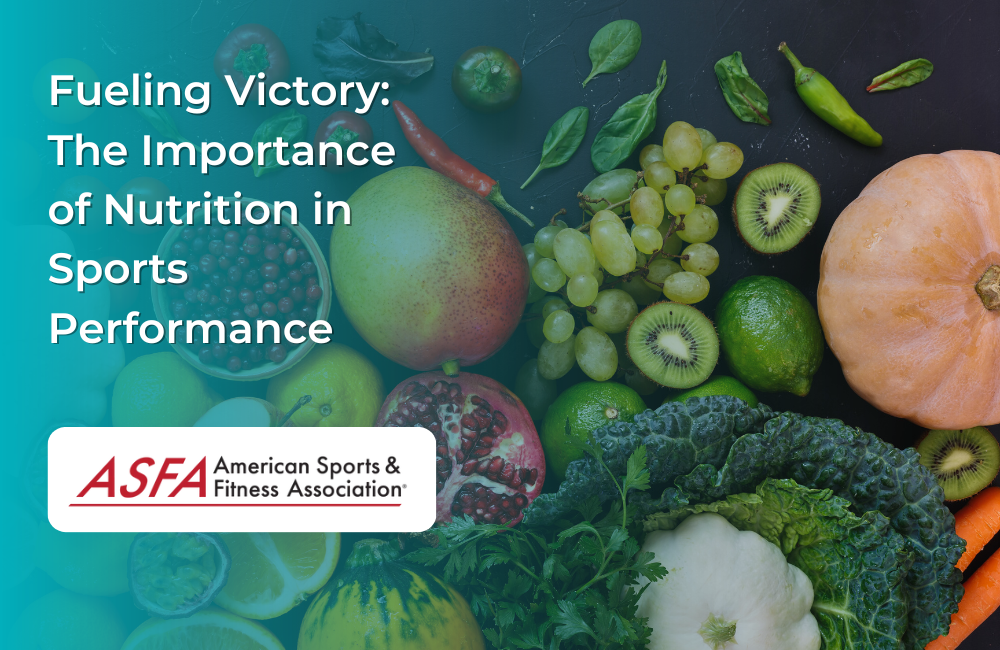When it comes to achieving peak athletic performance, athletes often focus on training, strength conditioning, and skill development. While these factors are undoubtedly crucial, the role of nutrition in sports performance should not be underestimated. Proper nutrition is the foundation upon which an athlete's physical and mental capabilities are built. In this blog, we will delve into the critical importance of nutrition in sports, how it impacts performance, and practical strategies for athletes to optimize their diets for success.
The Role of Nutrition in Sports Performance
Nutrition is the science of how the body obtains and uses food for energy, growth, and repair. In the context of sports performance, nutrition plays several vital roles:
1. Energy Production:
Carbohydrates are the body's primary source of energy. During exercise, the muscles rely heavily on stored carbohydrates (glycogen) to fuel physical activity. Insufficient carbohydrate intake can lead to premature fatigue and reduced performance.
2. Muscle Recovery and Repair:
Proteins are essential for muscle repair and growth. Intense training places stress on muscle fibers, and adequate protein intake helps repair and strengthen these fibers. Amino acids, the building blocks of proteins, are crucial for recovery.
3. Hydration:
Maintaining proper fluid balance is critical for performance. Dehydration can lead to decreased endurance, muscle cramps, and impaired cognitive function. Electrolytes, such as sodium and potassium, play a role in maintaining fluid balance.
4. Nutrient Timing:
The timing of nutrient intake is vital. Consuming the right nutrients before, during, and after exercise can optimize performance, reduce muscle damage, and accelerate recovery.
5. Immune Function:
Intense training can weaken the immune system. Proper nutrition, including vitamins and minerals, supports immune function, reducing the risk of illness or injury that could sideline an athlete.
Key Nutrients for Athletes
To excel in sports, athletes must ensure they receive adequate amounts of key nutrients. Here are some crucial nutrients and their roles:
1. Carbohydrates:
- Role: Provide energy for high-intensity exercise.
- Sources: Whole grains, fruits, vegetables, legumes.
2. Protein:
- Role: Supports muscle repair and growth.
- Sources: Lean meats, poultry, fish, dairy, eggs, plant-based sources (e.g., beans, tofu).
3. Fats:
- Role: Provide a long-lasting source of energy.
- Sources: Healthy fats from avocados, nuts, seeds, and fatty fish (e.g., salmon, mackerel).
4. Vitamins and Minerals:
- Role: Support various bodily functions, including immune function and muscle contraction.
- Sources: A well-balanced diet with a variety of fruits, vegetables, and whole grains.
5. Hydration:
- Role: Maintains fluid balance and regulates body temperature.
- Sources: Water, sports drinks (in moderation), fruits, and vegetables.
Practical Nutrition Strategies for Athletes
Achieving the ideal balance of nutrients can be challenging but is essential for optimal sports performance. Here are some practical nutrition strategies for athletes:
1. Develop a Balanced Diet:
- Prioritize whole, unprocessed foods.
- Ensure a mix of carbohydrates, proteins, and healthy fats in each meal.
- Customize your diet based on your specific sport, training intensity, and goals.
2. Timing Matters:
- Consume a balanced meal or snack 2-3 hours before exercise.
- Include carbohydrates and protein to fuel and prepare the muscles.
- Refuel within 30 minutes after exercise to optimize recovery.
3. Stay Hydrated:
- Drink water regularly throughout the day.
- Monitor hydration by checking urine color (pale yellow is optimal).
- During exercise, drink fluids containing electrolytes if the activity is intense and prolonged.
4. Monitor Micronutrient Intake:
- Consume a variety of fruits and vegetables to ensure you get essential vitamins and minerals.
- Consider consulting with a sports dietitian to assess your nutrient needs and potential deficiencies.
5. Experiment and Adjust:
- Nutrition is highly individualized. Experiment with different foods, timing, and quantities to find what works best for you.
- Keep a food journal to track your intake and assess its impact on your performance.
6. Seek Professional Guidance:
- Consider working with a registered dietitian or sports nutritionist who specializes in athlete nutrition. They can provide personalized guidance and meal plans tailored to your needs.
Conclusion
In the world of sports, success is often measured by inches and milliseconds. Athletes dedicate countless hours to training and improving their skills. However, without proper nutrition, these efforts may not yield the desired results. Nutrition is the cornerstone of sports performance, providing the energy, recovery, and endurance necessary to excel. Athletes who prioritize their diets and make informed nutritional choices set themselves up for success both on and off the field. Remember, your body is your most essential piece of equipment, and fueling it properly is the key to achieving victory in sports.





